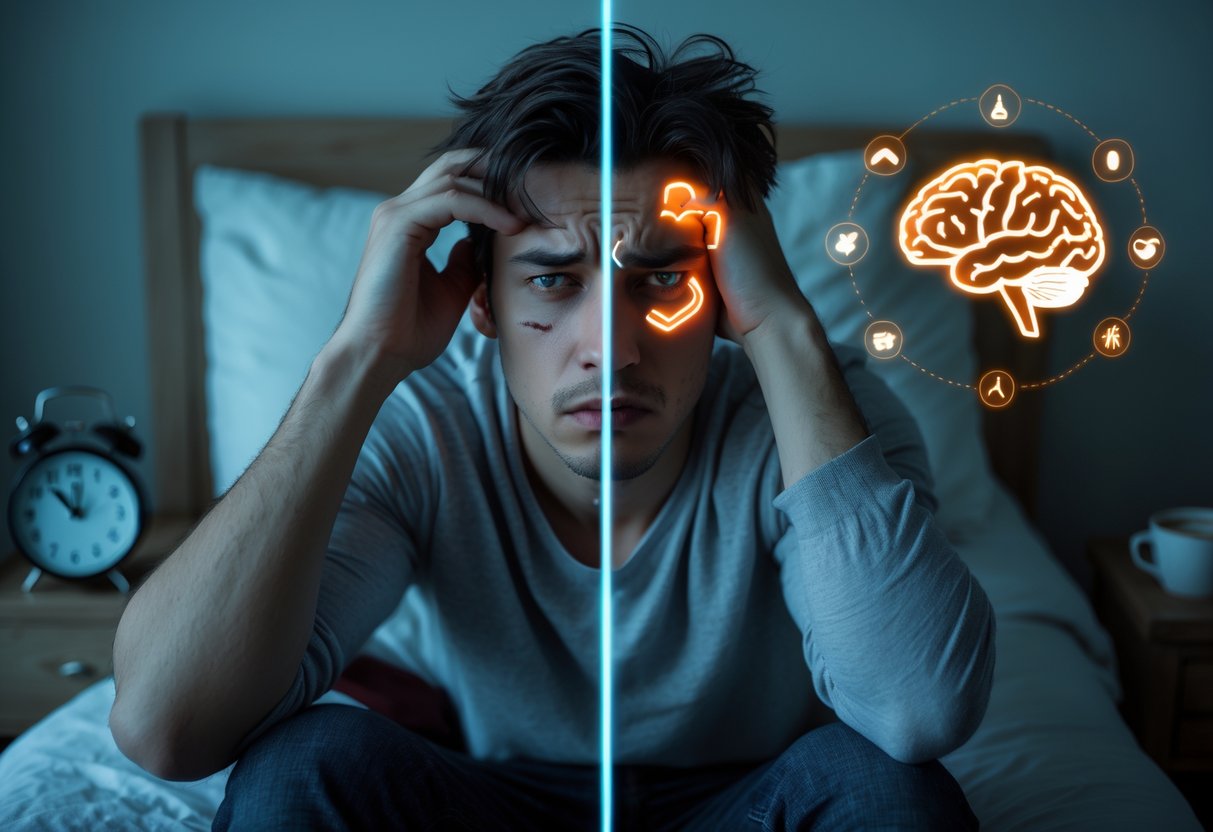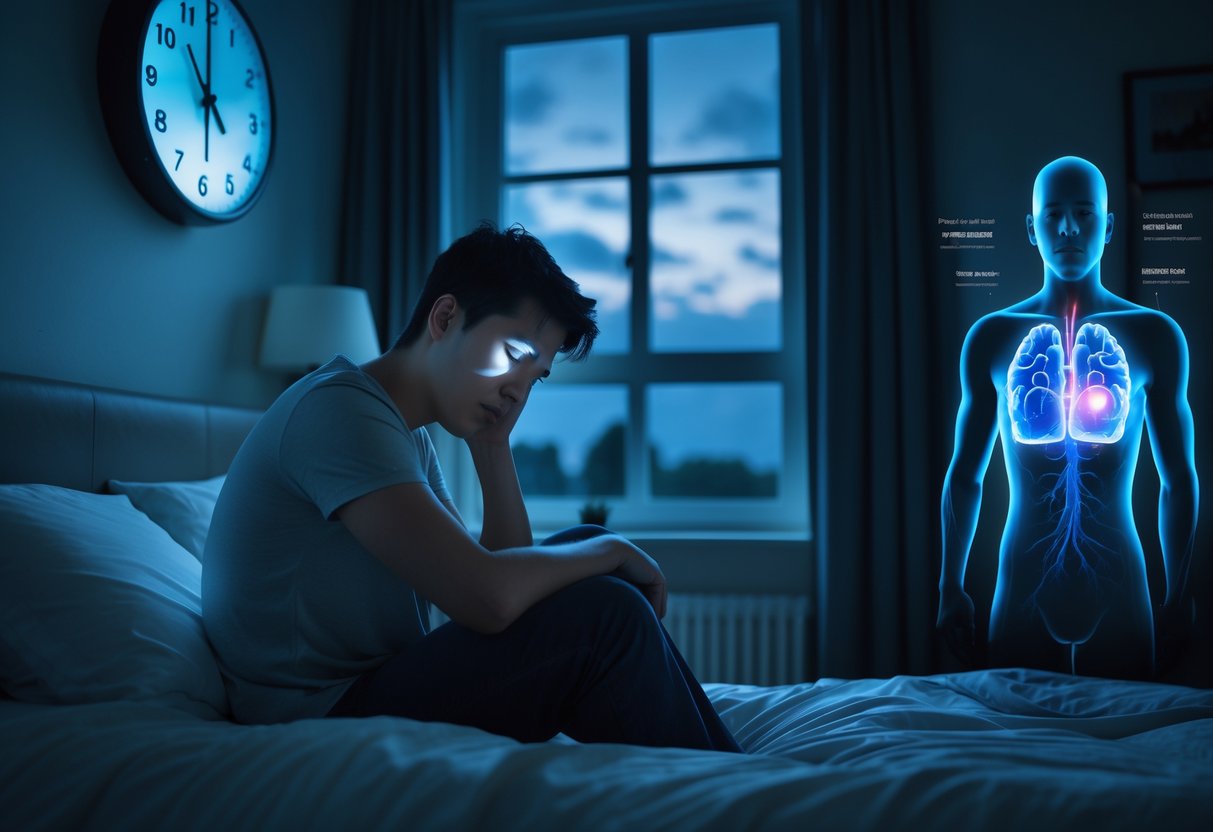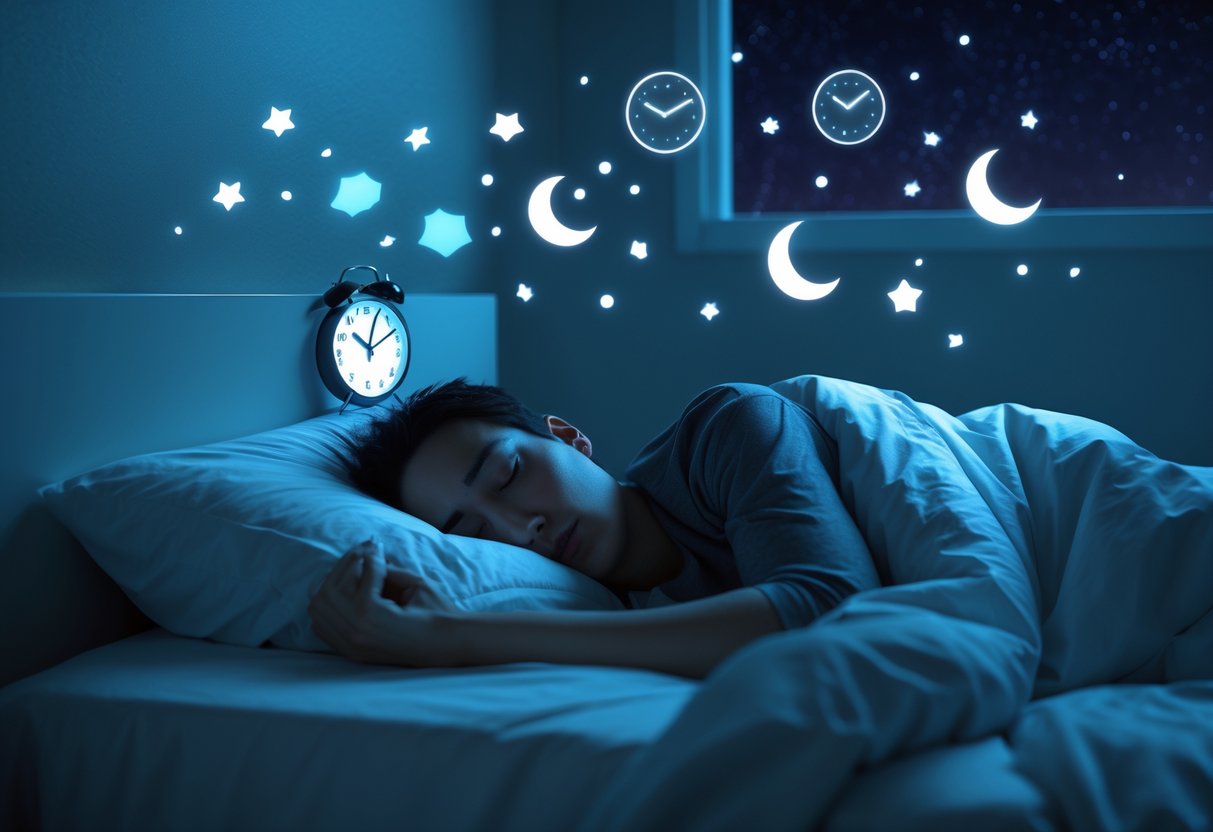Most people don’t realize how quickly their body begins to change when they lose sleep. Sleep deprivation happens when you do not get enough sleep to meet your body’s needs[1], and even small amounts of lost sleep can trigger a cascade of physical and mental changes.

When someone restricts their sleep below seven hours per night, their body experiences significant changes in brain function, hormone production, and immune response within just a few days. Research shows that chronic sleep restriction produces neurobehavioral deficits including attention lapses, slowed working memory, and mood changes[2]. These effects build up over time, making each day of poor sleep worse than the last.
The human body treats sleep restriction as a serious threat. During periods of reduced sleep, the brain struggles to clear waste products, stress hormones increase, and the immune system weakens. Understanding these changes helps explain why people feel terrible after just a few nights of poor sleep and why getting enough rest is so important for health.
Key Takeaways
- Sleep restriction below seven hours per night causes immediate changes in brain function, attention, and memory that worsen each day
- The body responds to lost sleep by altering hormone levels, immune function, and physical recovery processes
- Chronic sleep restriction leads to serious long-term health risks including metabolic problems and increased disease risk
Understanding Sleep Restriction

Sleep restriction involves deliberately limiting time in bed to create a specific sleep schedule, while sleep deprivation refers to the broader lack of adequate sleep. Both acute and chronic forms affect the body differently, with chronic restriction causing cumulative effects over multiple nights.
Definition of Sleep Restriction
Sleep restriction therapy is a behavioral treatment[3] that involves limiting the amount of time a person spends in bed. This approach aims to improve sleep efficiency by matching bed time to actual sleep time.
The process works by establishing a consistent wake-up time and avoiding daytime naps. People typically start by tracking their current sleep patterns for one to two weeks.
A sleep specialist then calculates the person’s sleep window based on their actual sleep time. For example, if someone sleeps only 5 hours but spends 8 hours in bed, their initial sleep window might be set to 5.5 hours.
The goal isn’t to reduce how much sleep you’re getting[4] but rather to make sleep time more efficient and restorative. Over time, as sleep efficiency improves, the sleep window gradually expands.
Types of Sleep Restriction: Acute vs. Chronic
Acute sleep restriction happens over one to three nights. The body can often handle short-term sleep loss without major health consequences.
Chronic sleep restriction occurs when sleep duration is reduced below 7 hours per night for multiple consecutive days[2]. This type creates cumulative effects that build up over time.
Research shows that chronic restriction produces more severe impacts than acute restriction. Following days of chronic restriction of sleep duration below 7 hours per night, significant daytime cognitive dysfunction accumulates[2].
The effects of chronic sleep restriction can match those seen after 1 to 3 nights of total sleep loss. This means losing 2 hours of sleep each night for a week can be as harmful as staying awake for an entire night.
Differences Between Sleep Restriction and Sleep Deprivation
Sleep restriction and sleep deprivation are related but distinct concepts. Understanding their differences helps explain how each affects the body.
Sleep Restriction:
- Planned reduction in time spent in bed
- Used as a therapeutic tool
- Typically involves 4-6 hours of sleep nightly
- Often part of cognitive behavioral therapy for insomnia
Sleep Deprivation:
- Broader term for insufficient sleep
- Can be voluntary or involuntary
- Includes total sleep loss or partial sleep loss
- Results from various causes like work, lifestyle, or medical conditions
Partial sleep deprivation can occur in 3 ways[2]: sleep fragmentation, selective sleep stage deprivation, and sleep restriction. Sleep fragmentation breaks up normal sleep patterns. Selective sleep stage deprivation affects specific phases of sleep.
Total sleep deprivation means staying awake for 24 hours or more. This creates immediate and severe effects compared to the gradual buildup seen with chronic sleep restriction.
How Sleep Restriction Alters the Sleep Cycle

When sleep duration decreases, the body prioritizes certain sleep stages over others, leading to significant changes in how much time is spent in each phase. Sleep restriction fundamentally alters sleep architecture[2], with deep sleep being preserved while REM sleep and lighter stages are reduced.
Impact on REM Sleep and Non-REM Sleep
Sleep restriction has unequal effects on different sleep stages. Research shows that when healthy adults are restricted to 4 hours of sleep, they experience decreased time in REM sleep and NREM stage 2 sleep.
The body appears to prioritize non-REM sleep over REM sleep during restriction. This means people lose more REM sleep than other stages when total sleep time is reduced.
REM sleep typically occurs in longer periods toward the end of the night. When sleep duration is cut short, these later REM periods are often eliminated entirely.
Non-REM sleep, particularly the deeper stages, gets compressed but not eliminated. The brain seems to protect certain aspects of non-REM sleep even when time in bed is severely limited.
This uneven impact creates an imbalance in the normal sleep cycle. The typical progression through sleep stages becomes disrupted when there isn’t enough time for complete cycles.
Changes in Deep Sleep and Light Sleep Stages
Deep sleep shows remarkable resilience during sleep restriction. Studies reveal that when people sleep only 4 hours per night, they maintain nearly the same amount of slow wave sleep as during 8-hour nights.
The body achieves this by falling asleep faster and spending less time in lighter sleep stages. Sleep restriction causes decreased time in NREM stage 2 sleep[2] while preserving deeper stages.
Light sleep stages get compressed or skipped entirely. The brain moves more quickly through these stages to reach the deeper, more restorative phases of sleep.
Slow wave activity actually intensifies during restriction. The brain produces stronger delta waves during deep sleep, suggesting it’s working harder to achieve restoration in less time.
This preservation comes at a cost. While deep sleep quantity may be maintained, the overall sleep architecture becomes less natural and balanced.
Sleep Duration and Time in Bed
Time in bed doesn’t always equal actual sleep time. Sleep restriction experiments typically control time in bed rather than just sleep duration, creating a clear boundary for sleep opportunity.
When time in bed is limited to 4-6 hours, people typically fall asleep faster than usual. This reduces the gap between time in bed and total sleep time.
However, brief awakenings still occur throughout the night. Even with restricted time in bed, some minutes are lost to these natural sleep interruptions.
Sleep efficiency often improves during restriction because people spend a higher percentage of their time in bed actually sleeping. Less time is wasted lying awake.
The relationship between sleep opportunity and sleep need becomes apparent during restriction. Most adults require 7-9 hours of sleep, so restricting time in bed to 4-6 hours creates a significant sleep debt.
Immediate Effects on Brain Function and Cognitive Performance

Sleep restriction quickly disrupts key brain functions, with cognitive performance declining[5] within hours of reduced sleep. The brain struggles to maintain focus, process information efficiently, and stay alert during routine tasks.
Sustained Attention and Attentional Lapses
Sleep restriction severely impairs the brain’s ability to maintain focus over time. People experience frequent attentional lapses where they briefly lose concentration during tasks.
The psychomotor vigilance task reveals how sleep loss affects sustained attention. This simple reaction test shows that sleep-deprived individuals respond slower and miss more signals.
Brain scans show reduced activity[5] in the prefrontal cortex and thalamus during attention tasks. These areas normally work together to keep people alert and focused.
Attentional lapses increase dramatically after just one night of poor sleep. The lapses become more frequent and last longer as sleep debt builds up over multiple days.
People often don’t notice these brief attention failures. However, they can lead to serious mistakes during driving, work tasks, or other activities requiring focus.
Working Memory and Cognitive Throughput
Working memory holds and processes information temporarily in the mind. Sleep restriction reduces this mental workspace, making it harder to juggle multiple pieces of information.
Cognitive throughput – the speed of mental processing – drops significantly with sleep loss. Simple math problems take longer to solve. Reading comprehension slows down.
The brain’s frontal regions, which control working memory, become less active during sleep deprivation. This explains why people struggle with complex thinking tasks.
Memory tests show clear deficits after sleep restriction. People remember fewer items from word lists and make more errors on memory tasks.
These working memory problems affect daily activities like following directions, having conversations, or learning new information.
Microsleeps and Microsleep Episodes
Microsleeps are brief episodes where the brain briefly falls asleep for 1-15 seconds while a person appears awake. The eyes may stay open, but brain activity shows sleep patterns.
These episodes happen involuntarily during sleep restriction. People often don’t realize they’ve experienced a microsleep episode.
EEG recordings reveal that parts of the brain enter sleep-like states while other areas remain awake. This creates a mixed state of consciousness.
Microsleeps occur more frequently during boring or repetitive tasks. They pose serious safety risks during activities like driving or operating machinery.
The frequency of microsleep episodes increases with longer periods of sleep restriction. Even short microsleeps can cause missed information or delayed reactions.
Cognitive Impairments and Performance Tasks
Sleep deprivation affects multiple cognitive abilities[6] including judgment, decision-making, and problem-solving. Performance drops across different types of mental tasks.
Reaction times slow down significantly during sleep restriction. Simple tasks that normally take milliseconds require more time and effort.
Complex cognitive tasks suffer more than simple ones. Multi-step problems become particularly difficult when sleep-deprived.
The brain shows inconsistent performance during sleep restriction. People may perform normally one moment, then make serious errors the next.
Performance tasks reveal that cognitive abilities decline[7] in a predictable pattern. Attention fails first, followed by working memory, then higher-order thinking skills.
The Role of Sleep Drive and Circadian Regulation

Sleep restriction disrupts two key biological systems that control when people fall asleep and stay awake. The body’s internal sleep drive builds pressure for rest throughout waking hours, while circadian rhythms coordinate this process with the natural 24-hour light-dark cycle.
Sleep Drive and Sleep Propensity
Sleep drive builds with every hour a person stays awake[8], creating increasing pressure to fall asleep. This biological process works like a timer that starts when someone wakes up.
The longer someone remains awake, the stronger their sleep propensity becomes. Sleep restriction forces people to ignore these natural signals from their body.
When sleep drive reaches high levels, the body produces adenosine in the brain. This chemical makes people feel drowsy and less alert. Coffee blocks adenosine receptors, which is why caffeine helps people stay awake.
During sleep restriction, adenosine continues building up beyond normal levels. This creates an overwhelming urge to sleep that becomes harder to fight. The body tries to compensate by increasing sleep pressure even more.
Key effects of disrupted sleep drive include:
- Increased drowsiness during the day
- Difficulty concentrating
- Slower reaction times
- Higher risk of falling asleep unexpectedly
Circadian Rhythms and Their Influence
Circadian rhythm follows a 24-hour pattern that tells the body when to sleep and wake up[9]. This internal clock controls much more than just sleep timing.
The body’s circadian rhythms also regulate hormone production, body temperature, and digestion. Light exposure, especially in the morning, helps keep these rhythms aligned with the day-night cycle.
Sleep restriction throws off this careful timing system. When people don’t sleep at regular times, their circadian clock becomes confused about what time it really is.
The circadian process normally opposes the drive to fall asleep during daytime hours[10]. In the evening, it aligns with sleep drive to help people fall asleep naturally.
During sleep restriction, this coordination breaks down. The body receives mixed signals about when it should be alert or sleepy.
Circadian disruption affects:
- Core body temperature patterns
- Hormone release timing
- Digestive function
- Mental alertness throughout the day
Melatonin Release and Biological Clock
Melatonin acts as the body’s natural sleep signal, released by the pineal gland when darkness falls. This hormone helps coordinate sleep timing with the external environment.
The biological clock in the brain controls melatonin production. Light exposure, especially blue light, suppresses melatonin release and keeps people alert.
During sleep restriction, melatonin patterns become irregular. People may not produce enough melatonin at the right times to feel naturally sleepy.
Artificial light from screens and room lighting can further disrupt melatonin production. This makes it even harder for sleep-restricted individuals to fall asleep when they finally get the chance.
The timing of melatonin release shifts when people consistently sleep at irregular hours. This creates a cycle where falling asleep becomes increasingly difficult.
Melatonin disruption leads to:
- Difficulty falling asleep at bedtime
- Poor sleep quality when sleep occurs
- Daytime grogginess
- Continued circadian rhythm problems
Physical and Emotional Consequences of Reduced Sleep

Sleep restriction triggers a cascade of changes throughout the body and mind. These effects range from immediate fatigue and mood shifts to long-term health risks that can impact every major body system.
Daytime Sleepiness and Fatigue
Subjective sleepiness becomes one of the most noticeable effects when people don’t get enough sleep. This overwhelming urge to sleep during normal waking hours can strike at any time.
Fatigue goes beyond just feeling tired. It affects both physical and mental energy levels. People experience reduced strength, slower reflexes, and difficulty concentrating on tasks.
Sleep loss impairs reaction time significantly. Studies show that staying awake for 18 hours straight affects performance similar to having a blood alcohol level of 0.05%.
The body’s natural alertness cycles become disrupted. People may feel alert briefly but then experience sudden waves of drowsiness. This creates dangerous situations while driving or operating machinery.
Daytime sleepiness also affects work performance. Simple tasks take longer to complete. People make more mistakes and struggle to stay focused during meetings or conversations.
Mood, Emotion, and Mental Health
Sleep restriction changes how the brain processes emotions. People become more irritable, anxious, and prone to mood swings when they don’t get adequate rest.
The brain’s emotional control centers don’t work properly without enough sleep. This makes it harder to cope with stress and handle everyday challenges. Small problems can feel overwhelming.
Sleep deficiency has been linked to depression and risk-taking behavior[11]. People may experience persistent sadness or engage in activities they normally wouldn’t consider.
Children and teens show different emotional responses. They may become more aggressive, impulsive, or withdrawn. Their ability to get along with friends and family members suffers.
Key emotional changes include:
- Increased irritability and anger
- Higher anxiety levels
- Difficulty controlling emotions
- Reduced motivation
- Problems with social interactions
Physical Health Risks and Immune Function
Sleep restriction weakens the body’s ability to fight off infections. The immune system doesn’t respond properly to germs and sickness[11] without adequate rest.
Hormone levels become unbalanced during sleep loss. The hormones that control hunger and fullness get disrupted. People feel hungrier and may gain weight more easily.
Blood sugar control suffers when sleep is limited. The body doesn’t react to insulin properly, which may raise diabetes risk[11] over time.
Heart health also takes a hit. Sleep restriction increases the risk of heart disease, high blood pressure, and stroke[11]. The cardiovascular system needs sleep to repair and maintain itself.
Major physical health risks:
- Weakened immune function
- Weight gain and obesity
- Higher diabetes risk
- Increased blood pressure
- Greater chance of heart problems
The body’s natural healing processes slow down without proper sleep. Wounds take longer to heal, and muscle recovery after exercise is delayed.
Chronic Sleep Restriction, Disorders, and Long-Term Risks

Long-term sleep problems create a compound effect where missed sleep builds up over time and becomes linked to serious medical conditions. Chronic sleep deprivation affects multiple body systems[12] and increases risks for heart disease, diabetes, and mental health disorders.
Development of Sleep Debt
Sleep debt occurs when someone consistently gets less sleep than their body needs. Adults require 7-9 hours of sleep per night for optimal health.
When people miss even one hour of sleep each night, the deficit adds up quickly. After five nights of getting six hours instead of seven, they have accumulated five hours of sleep debt.
The body cannot fully adapt to chronic sleep restriction. Research shows that behavioral and physiological consequences[13]worsen over time rather than stabilize.
Key effects of accumulated sleep debt include:
- Decreased reaction time and attention
- Impaired memory formation
- Weakened immune system response
- Increased stress hormone levels
Unlike a financial debt, sleep debt cannot be completely “paid back” with one good night of rest. The body needs consistent adequate sleep to restore normal function.
Weekend sleep-ins help but do not fully reverse the damage from weekday sleep restriction. The most effective approach involves maintaining regular sleep schedules with sufficient nightly rest.
Link with Insomnia and Sleep Disorders
Chronic sleep restriction often develops into clinical insomnia or reveals underlying sleep disorders. Insomnia becomes chronic when it happens at least three nights per week for three months or more[14].
People who voluntarily restrict their sleep may find they cannot sleep well even when they try. Their sleep quality deteriorates as their bodies become stressed from ongoing sleep loss.
Common patterns include:
- Difficulty falling asleep despite fatigue
- Frequent nighttime awakenings
- Early morning awakening with inability to return to sleep
- Non-restorative sleep that leaves people tired
The relationship between sleep restriction and insomnia creates a cycle. Poor sleep quality leads to daytime fatigue, which can disrupt natural sleep rhythms further.
Studies show that sleep disruption involves increased activity of stress response systems[15]. These changes make it harder for the brain to transition into healthy sleep patterns.
Obstructive Sleep Apnea and Other Conditions
Chronic sleep problems increase the risk of developing obstructive sleep apnea and other serious sleep disorders. Sleep apnea involves repeated breathing interruptions during sleep that prevent deep, restorative rest.
Risk factors that connect sleep restriction to sleep apnea:
| Factor | How It Contributes |
|---|---|
| Weight gain | Sleep loss affects hormones that control hunger |
| Inflammation | Poor sleep increases inflammatory responses |
| Muscle tone changes | Sleep debt can affect throat muscle control |
People with existing sleep apnea who also restrict their sleep face compounded health risks. The combination creates severe oxygen drops and frequent sleep interruptions.
Other sleep disorders linked to chronic restriction include restless leg syndrome and circadian rhythm disorders. These conditions further reduce sleep quality and create additional health complications.
Long-term consequences include increased risks of hypertension, diabetes, cardiovascular disease, and metabolic syndrome[15]. The body’s ability to regulate blood pressure, blood sugar, and inflammation becomes impaired.
Treatment requires addressing both the underlying sleep restriction and any developed sleep disorders through medical evaluation and sleep studies.
Adapting and Coping with Sleep Restriction

The body develops several strategies to manage ongoing sleep loss, though these adaptations have clear limits. Recovery mechanisms like napping provide temporary relief, while genetic differences determine how well individuals handle sleep debt.
Napping and Recovery Sleep
Strategic napping can help counter some effects of sleep restriction. Short naps of 10-30 minutes boost alertness without causing grogginess. These brief sleep periods improve reaction times and mood temporarily.
Longer naps of 60-90 minutes allow for complete sleep cycles. They provide deeper restoration but may cause sleep inertia upon waking. This grogginess can last 15-30 minutes after longer naps.
Recovery sleep on weekends[16] helps reduce some accumulated sleep debt. However, sleeping in delays the body’s internal clock. This makes it harder to fall asleep Sunday night.
Optimal napping strategies include:
- Napping before 3 PM
- Keeping naps under 30 minutes
- Using caffeine strategically before short naps
- Maintaining consistent weekend sleep schedules
Weekend recovery sleep cannot fully eliminate the effects of chronic restriction. The body needs several nights of adequate sleep to restore normal function completely.
Individual Variability and Genetic Factors
People show dramatic differences in how they handle sleep loss. Some individuals maintain better cognitive function during restriction[2] than others. These differences appear stable over time.
Research suggests genetic factors influence sleep restriction tolerance. Certain gene variants affect how quickly adenosine builds up during wakefulness. Adenosine is the chemical that makes us feel sleepy.
Key factors affecting individual responses:
- Age (older adults often more vulnerable)
- Chronotype (morning vs. evening preference)
- Baseline sleep need
- Previous sleep debt
- Overall health status
Some people function reasonably well on 6 hours of sleep. Others need 8-9 hours to avoid significant impairment. These individual differences remain consistent across different types of sleep restriction.
The most vulnerable individuals show severe cognitive decline after just one night of restricted sleep. Resilient individuals may maintain performance for several days before showing clear deficits.
Neuroimaging and Future Research Directions
Brain imaging reveals how neural networks adapt to ongoing sleep restriction. The prefrontal cortex, responsible for attention and decision-making, shows reduced activity first. Other brain regions try to compensate for this decline.
Neuroimaging studies show increased activation in motor and sensory areas during sleep loss. This suggests the brain works harder to maintain basic functions. However, this compensation has limits and eventually fails.
Current research focuses on:
- Identifying biomarkers for sleep debt
- Understanding recovery mechanisms
- Developing personalized sleep recommendations
- Creating targeted interventions
Future studies aim to predict individual vulnerability to sleep restriction. Scientists are examining genetic markers, brain structure, and sleep patterns. This research could lead to personalized sleep schedules.
New neuroimaging techniques reveal real-time changes in brain connectivity. These tools help researchers understand how sleep restriction affects different neural networks. The goal is developing better treatments for chronic sleep loss.
Frequently Asked Questions

Sleep restriction affects both immediate daily functioning and long-term health outcomes. The body experiences measurable changes in cognitive performance, mood regulation, and physical recovery processes when sleep duration falls below optimal levels.
What are the common symptoms experienced due to inadequate sleep?
People with inadequate sleep typically experience lapses of attention, slowed working memory, reduced cognitive throughput, depressed mood, and perseveration of thought[2]. These symptoms build up over time rather than appearing all at once.
The brain shows clear signs of impairment after just one night of poor sleep. Memory formation becomes harder and reaction times slow down noticeably.
Physical symptoms include heavy eyelids and difficulty keeping eyes open. The body also struggles to maintain normal temperature regulation throughout the day.
Mood changes happen quickly with sleep loss. People become more irritable and have trouble controlling emotional reactions to everyday situations.
How does sleep deprivation impact mental health and psychological well-being?
Sleep restriction causes significant changes in emotional processing and mood stability. Neurobehavioral deficits accumulate across days of partial sleep loss to levels equivalent to those found after 1 to 3 nights of total sleep loss[2].
Depression symptoms worsen when people consistently get less than seven hours of sleep per night. Anxiety levels also increase as the brain struggles to process daily stress normally.
The mind has trouble breaking out of negative thought patterns. This makes it harder to solve problems or see situations from different angles.
Emotional regulation becomes much more difficult. Small frustrations feel overwhelming and positive emotions seem muted or distant.
Can the brain experience long-term damage from consistent sleep deprivation?
Research shows that chronic sleep restriction produces measurable changes in brain function over time. The exact extent of permanent damage remains unclear in current scientific studies.
Individual variability in neurobehavioral responses to sleep restriction appears to be stable, suggesting a traitlike differential vulnerability[2]. Some people show more resistance to sleep loss effects than others.
Memory consolidation suffers with ongoing sleep restriction. The brain cannot properly transfer information from short-term to long-term storage without adequate rest.
Attention networks in the brain show persistent problems even after sleep improves. Recovery may take weeks or months depending on how long the restriction lasted.
What should one expect during the first week of sleep restriction therapy?
Sleep restriction therapy limits time in bed and gradually increases that time until falling asleep quickly and sleeping through the night[17]. The first week typically involves significant daytime tiredness.
Most people feel more sleepy than usual during daytime hours. This increased tiredness is actually the goal of the treatment process.
Sleep becomes more consolidated at night even though total sleep time decreases initially. The mind produces enough sleep pressure to fall asleep quickly when going to bed[18].
Energy levels may fluctuate throughout the day. Morning alertness often improves while afternoon drowsiness becomes more noticeable.
Are there proven strategies to quickly recover from sleep debt?
Sleep debt recovery requires consistent longer sleep periods rather than occasional extended sleep sessions. The brain needs regular, adequate rest to restore normal function.
Weekend sleep-ins provide some benefit but cannot fully compensate for weekday sleep restriction. Daily sleep consistency works better than trying to catch up all at once.
Sleep restriction therapy can help reset sleep patterns within 3-6 weeks when the schedule is followed strictly[19]. Most patients see improvements in sleep quality during this timeframe.
Napping during recovery can help but should be limited to early afternoon. Long or late naps can interfere with nighttime sleep consolidation.
What are the potential long-term health consequences of chronic sleep restriction?
Chronic sleep restriction affects multiple body systems beyond just brain function. Laboratory studies of healthy adults subjected to sleep restriction have found adverse effects on endocrine functions, metabolic and inflammatory responses[2].
The immune system weakens with ongoing sleep restriction. People become more susceptible to infections and take longer to recover from illness.
Metabolism slows down and appetite regulation becomes disrupted. Weight gain often occurs as the body struggles to maintain normal hormone balance.
Cardiovascular health suffers from chronic sleep loss. Blood pressure tends to rise and heart rate variability decreases over time.
Inflammatory markers increase throughout the body. This chronic inflammation contributes to various health problems including joint pain and digestive issues.
References
- Sleep deprivation happens when you do not get enough sleep to meet your body’s needs. https://www.verywellhealth.com/what-are-the-physical-effects-of-sleep-deprivation-3015079 Accessed November 9, 2025
- Behavioral and Physiological Consequences of Sleep Restriction. https://pmc.ncbi.nlm.nih.gov/articles/PMC1978335/ Accessed November 9, 2025
- Understanding Sleep Restriction Therapy. https://www.thesleepreset.com/blog/sleep-restriction-therapy-and-does-it-work Accessed November 9, 2025
- What Is Sleep Restriction Therapy? Who Should Use It?. https://www.healthline.com/health/healthy-sleep/sleep-restriction-therapy Accessed November 9, 2025
- The consequences of sleep deprivation on cognitive performance. https://pmc.ncbi.nlm.nih.gov/articles/PMC10155483/ Accessed November 9, 2025
- What are the consequences of sleep deprivation on brain function?. https://scienceofmind.org/what-are-the-consequences-of-sleep-deprivation-on-brain-function/ Accessed November 9, 2025
- The sleep-deprived human brain. https://pmc.ncbi.nlm.nih.gov/articles/PMC6143346/ Accessed November 9, 2025
- How Your Circadian Rhythm Helps You Sleep. https://www.thensf.org/how-your-circadian-rhythm-helps-you-sleep/ Accessed November 9, 2025
- Circadian Rhythm: What It Is, How It Works & What Affects It. https://my.clevelandclinic.org/health/articles/circadian-rhythm Accessed November 9, 2025
- Sleep & Circadian Basics. https://www.sleephealth.org/sleep-circadian-basics/ Accessed November 9, 2025
- Sleep Deprivation and Deficiency. https://www.nhlbi.nih.gov/health/sleep-deprivation/health-effects Accessed November 9, 2025
- Extent and Health Consequences of Chronic Sleep Loss and Sleep Disorders - Sleep Disorders and Sleep Deprivation. https://www.ncbi.nlm.nih.gov/books/NBK19961/ Accessed November 9, 2025
- Just a moment.... https://jcsm.aasm.org/doi/pdf/10.5664/jcsm.26918 Accessed November 9, 2025
- How sleep deprivation can harm your health. https://www.health.harvard.edu/staying-healthy/how-sleep-deprivation-can-harm-your-health Accessed November 9, 2025
- Short- and long-term health consequences of sleep disruption. https://pmc.ncbi.nlm.nih.gov/articles/PMC5449130/ Accessed November 9, 2025
- Dynamics of recovery sleep from chronic sleep restriction. https://pmc.ncbi.nlm.nih.gov/articles/PMC10108639/ Accessed November 9, 2025
- How Sleep Restriction Can Improve Your Sleep. https://www.thesleepreset.com/learn/sleep-restriction Accessed November 9, 2025
- The mind produces enough sleep pressure to fall asleep quickly when going to bed. https://support.stellarsleep.com/portal/en/kb/articles/sleep-restriction-therapy-srt-frequently-asked-questions-29-5-2023 Accessed November 9, 2025
- Can Sleep Restriction Therapy Work If I Can Only Sleep 5 Hours a Night?. https://www.eurekahealth.com/resources/sleep-restriction-therapy-insomnia-5-hours-only-en Accessed November 9, 2025
